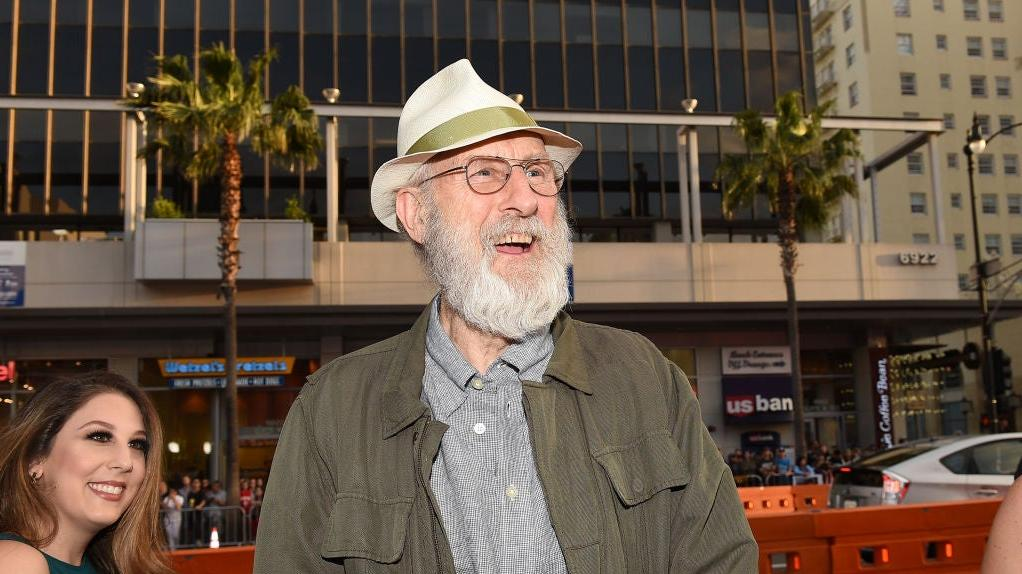Big Dairy, Look What You've Done To James Cromwell
The actor glued his hand to a Starbucks counter to protest... costly nut milks?
When actor James Cromwell strode into a Midtown Manhattan Starbucks yesterday, he was armed and dangerous. His weapon of choice? A small container of super glue, which he used to adhere his right hand to the coffee chain's counter. A hush fell over the crowd as Cromwell, flanked by PETA protestors, bellowed a decree to the quivering Starbucks baristas. "More than 13,000 customers have asked you, and now we're asking: will you stop charging more for vegan milk?" Well, Starbucks, will ya? Will ya, punks?
Why did James Cromwell super-glue himself to a Starbucks counter?
Per a PETA press release sent to The Takeout, yesterday's action was meant to condemn the coffee chain's extra charge for plant-based milk. "My friends at PETA and I are calling on Starbucks to stop punishing kind and environmentally conscious customers for choosing plant milks," Cromwell said in the release. "We all have a stake in the life-and-death matter of the climate catastrophe, and Starbucks should do its part by ending its vegan upcharge."
This is far from Cromwell's first PETA exploit. Known for his roles in Babe and, more recently, Succession, Cromwell is a longtime PETA protestor and honorary director. In 2017, he was charged with trespassing after interrupting an orca show at SeaWorld. That was his most hardcore action by far, although Cromwell did pen a strongly-worded letter to the president of Just Born Quality Confections, the company behind Peeps, encouraging the company to remove gelatin from its products. (Gelatin is made from the connective tissue of pigs and other animals, and Cromwell spent a lot of time hanging with pigs during production of Babe. Spend enough time with those bristly little guys, and you'd be boycotting Peeps, too.)
But Cromwell's latest protest addresses the high price of plant-based products, a major barrier to entry for consumers interested in ditching dairy. PETA writes:
"As Cromwell points out, the dairy industry is a major producer of the greenhouse gases that contribute to the climate catastrophe and is responsible for immense animal suffering."
With that, the organization is calling for Starbucks to reduce the price of vegan milks, thus reducing consumers' reliance on dairy milks.
How much does Starbucks charge for plant-based milk?
Cromwell's right: there's a significant upcharge for Starbucks drinks made with plant-based milk products, often up to a dollar more than you'd pay for, say, a latte made with dairy milk. "Customers can customize any beverage on the menu with a non-dairy milk, including soymilk, coconutmilk, almondmilk, and oatmilk for an additional cost (similar to other beverage customizations such as an additional espresso shot or syrup)," a Starbucks spokesperson said in a statement to the AP.
What's behind the upcharge? On the direct-to-consumer level, plant-based milks are way, way pricier than their dairy counterparts. At my local grocery store, a 64-ounce container of original Oatly currently costs $5.99 compared to a 128-ounce jug of 2% cow's milk, which costs $2.99.
There are a lot of reasons for the disparity. There's the fact that plant-based milks are produced on a smaller scale; there's the fact that companies like Oatly often deliver their products in eco-friendly Tetra Pak or Pure-Pak packaging, which accounts for a higher packaging budget. But if you really want someone to blame, blame the dairy lobby, one of the most influential in Washington. The big spenders at Big Dairy aren't advocating for small dairy farmers, who've struggled immensely throughout the pandemic. Instead, they're funding industrial dairies, helping these mega milkers exploit tax breaks and dominate the marketplace. PETA writes:
"Between 2006 and 2021, two-thirds of American farmers didn't receive a single cent from subsidies, which totaled more than $100 billion. Most of the money went to big corporations, which harm animals and the environment on a massive scale."
Still, plant-based milk products aren't entirely blameless. Take Oatly, for example, which has come under fire for contributing to Amazonian deforestation in the Amazon and selling company stakes to Blackstone.
My take: helping Midtown Manhattanites save a buck on their daily latte isn't going to save the cows. That energy would be better spent advocating for small farmers and holding plant-based milk companies accountable for shady behavior. James Cromwell, get out your super glue—your work is far from done.
